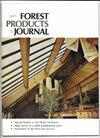Financial Analysis of Innovative Wood Products and Carbon Finance to Support Forest Restoration in California
IF 1.2
4区 农林科学
Q3 FORESTRY
引用次数: 1
Abstract
Traditional funding strategies of grants, congressional appropriations, and income from timber sales are insufficient to complete the level of forest restoration necessary throughout California. Stimulating investment into markets for low-value biomass—such as tops and branches of trees, small trees, and dead trees—will add value to forest raw materials and provide additional revenue streams to pay for forest restoration. We evaluate the investment potential of products made from low-value biomass using a discounted cash-flow analysis of several possible forest products including fuels and nonfuels under various climate policy and market scenarios. We demonstrate the carbon benefits provided by these products, attributed to their substitution for fossil-fuel feedstocks and long-term carbon storage. Our work finds that there is an opportunity to develop several highly profitable products, most notably fuels, many of which are eligible for energy and climate policy programs such as California's Low Carbon Fuel Standard and the federal Renewable Fuel Standard. Nonfuel products have an average internal rate of return (IRR) of 13 percent, whereas fuels have an average IRR of 19 percent in our baseline scenario. Although products ineligible for government incentives are generally less profitable, income from the voluntary carbon market greatly increases the IRR. Fostering investment into these products can encourage critically needed funding for forest management while developing a high-impact carbon removal solution enabled by state, federal, and voluntary climate initiatives. On this basis, we conclude that climate policy can support forest restoration in California.支持加州森林恢复的创新木制品和碳金融的财务分析
传统的拨款、国会拨款和木材销售收入的资助策略不足以完成整个加利福尼亚州所需的森林恢复水平。刺激对低价值生物质市场的投资,如树梢和树枝、小树和枯树,将增加森林原材料的价值,并为森林恢复提供额外的收入来源。在各种气候政策和市场情景下,我们通过对几种可能的森林产品(包括燃料和非燃料)进行贴现现金流分析,评估了低价值生物质产品的投资潜力。我们展示了这些产品提供的碳效益,归因于它们替代了化石燃料原料和长期碳储存。我们的工作发现,有机会开发几种高利润的产品,最著名的是燃料,其中许多产品符合能源和气候政策计划的条件,如加州的低碳燃料标准和联邦可再生燃料标准。非燃料产品的平均内部收益率(IRR)为13%,而在我们的基准情景中,燃料的平均内部回报率为19%。尽管不符合政府激励条件的产品通常利润较低,但来自自愿碳市场的收入大大提高了内部收益率。促进对这些产品的投资可以鼓励为森林管理提供急需的资金,同时开发由州、联邦和自愿气候倡议支持的高影响力碳去除解决方案。在此基础上,我们得出结论,气候政策可以支持加州的森林恢复。
本文章由计算机程序翻译,如有差异,请以英文原文为准。
求助全文
约1分钟内获得全文
求助全文
来源期刊

Forest Products Journal
工程技术-材料科学:纸与木材
CiteScore
2.10
自引率
11.10%
发文量
30
审稿时长
6-12 weeks
期刊介绍:
Forest Products Journal (FPJ) is the source of information for industry leaders, researchers, teachers, students, and everyone interested in today''s forest products industry.
The Forest Products Journal is well respected for publishing high-quality peer-reviewed technical research findings at the applied or practical level that reflect the current state of wood science and technology. Articles suitable as Technical Notes are brief notes (generally 1,200 words or less) that describe new or improved equipment or techniques; report on findings produced as by-products of major studies; or outline progress to date on long-term projects.
 求助内容:
求助内容: 应助结果提醒方式:
应助结果提醒方式:


